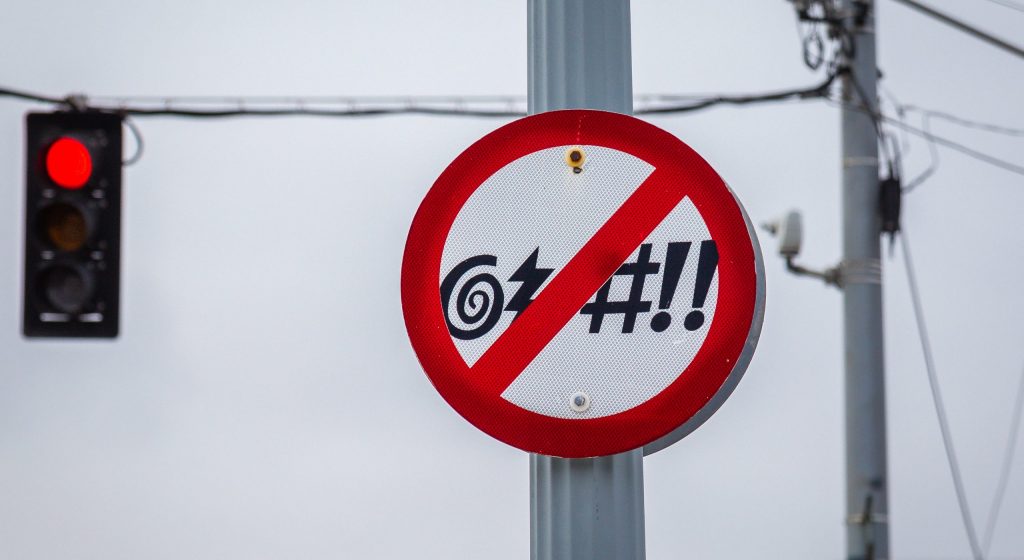This post is also available in Dutch.
When I was five years old, my schoolteacher made me sit in a corner and face the wall for what seemed like an inordinate amount of time because I had dropped a monosyllabic word that more prudently minded souls would refer to as the F-bomb. She chastised me for not, instead, employing substitute words like fudge, poop, or fiddlesticks. My penchant for potty mouth behavior raged on though, enriched and unabated, as I grew into adulthood. Though the use of a few choice obscenities may be unacceptable in polite society, swearing in general isn’t so bad at all.
Better, faster, stronger?
In a previous blog, we learned that cursing is not necessarily a bad habit—we curse for special reasons, even recruiting parts of our brains that are different from those recruited for normal, non-swearing language. In addition to physical effects (e.g. higher pain tolerance), the use of offensive language also has mental effects. A 2018 study showed that swearing aloud can increase performance in tasks of physical power and of physical strength without affecting heart rate or blood pressure. Participants who let off inappropriate verbal steam during a handgrip task performed better than they did in non-swearing conditions. Subjects were additionally tested for anaerobic power and capacity on a stationary bike and, again, fared better when uttering swear words (e.g. f*ck, sh*t, b*tch) than when using non-swear words (e.g. flat, small, beige).
$#@!% honest
Historically, societal perceptions of cussing have been entwined with immorality, antisociality, and dishonesty. Conversely, foul-mouthed individuals can also be considered more genuine because their language is unfiltered. By recording profanity measures from 276 people through self-report questionnaires, behavioral analyses in a laboratory setting, and linguistic analyses of real-life social interactions, a 2017 study explored the relationship between honesty and expletive use. They found that profanity was associated with less lying and deception at the individual level and with higher integrity at the societal level. Even swearing among colleagues and friends is a strong indication of the level of trust shared with each other—a sense of camaraderie. Still, let us not forget that American voters in 2016 mistook Donald Trump’s persistent stream of cursing as a mark of honesty.
Poor in speech, poor in smarts?
Proponents of antiseptic vocabulary would have us believe that those who are fluent in verbal vulgarities are uncultured, unfriendly, and unintelligent. A common misconception is that cursing is partly a result of poverty of speech; a person cannot find better words with which to express themselves because they lack the requisite vocabulary. Linguistic research, though, has shown us that taboo fluency is positively associated with verbal fluency; the more unique offensive words participants could produce, the more verbally fluent they were overall. Nevertheless, someone’s conceptual knowledge of curse words is entirely different from routinely wielding them in daily life. The same study also found that taboo fluency was also positively correlated with the personality traits of neuroticism and openness and negatively correlated with agreeableness and conscientiousness.
Whether you see foul language as a sign of blasphemous aggression or simply a method of conveying strong emotion, we can all agree that swearing is a powerful type of communication. In a scream or in a whisper, filthy language has strong effects on both the speaker and the listener. Research has proven to us that profanity serves a physiological, emotional and social purpose—but the use of such language is effective only because the words themselves are inappropriate. Different cultures curse in an assortment of ways depending on what is valued and what is unpopular, but we all share in the use and entertainment of such words because they are prohibited.
Author: Christienne Gonzales Damatac
Buddy: Francie Manhardt
Editor: Mónica Wagner
Translator: Wessel Hieselaar
Editor Translation: Felix Klaassen
